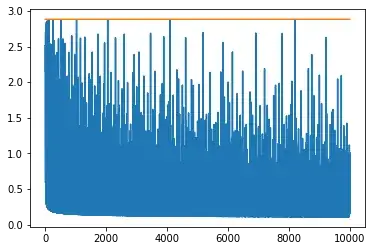Let $2=p_{1}<p_{2}<p_{3} ...$ be the list of all the consecutive primes
Suppose $m_{k}$ is a natural number that has prime divisors atmost $p_{k}$ with $p_{k}|m_{k}$. Note $m_{k}$ is of the form $\prod_{j=1}^{k}p_{j}^{\alpha_{j}}$. We calculate
$$\frac{\sigma(m_{k})}{m_{k}\log(p_{k})} = \frac{\prod_{j=1}^{k}\frac{(\sum_{u=0}^{\alpha_{j}}p_{j}^{u})}{p_{j}^{\alpha_{j}}}}{\log(p_{k})} \leq \frac{\prod_{j=1}^{k}(1+\sum_{u=1}^{\infty}\frac{1}{p_{j}^{u}})}{\log(p_{k})} \leq \frac{\prod_{j=1}^{k}(1+\frac{1}{p_{j}-1})}{\log(p_{k})}$$
Set $S(k) = \log(\prod_{j=1}^{k}(1+\frac{1}{p_{j}-1})) = \sum_{j=1}^{k}\log(1+\frac{1}{p_{j}-1})$. For $x \geq 0$ we have the inequality $\log(1+x) \leq x$. Thus
$$S(k) \leq \sum_{j=1}^{k}\frac{1}{p_{j}-1} \leq \sum_{j=1}^{k}\frac{1}{p_{j}}+C$$
For some constant $C > 0$. Also by What is the sum of the reciprocal of primes? (Yes, it diverges..) there exists some constant $D > 0$ so that
$\sum_{j=1}^{k}\frac{1}{p_{j}} \leq \log(\log(p_{k}))+D$.
Thus $S(k) \leq \log(\log(p_{k}))+E$ where $E = C+D$.
Hence
$\log(\frac{\sigma(m_{k})}{m_{k}\log(p_{k})}) \leq S(k) - \log(\log(p_{k})) \leq E$.
Hence
$\frac{\sigma(m_{k})}{m_{k}\log(p_{k})} \leq e^{E}$ where $E$ is independent of $k$. This proves the result.
Edit: If you want the tightest bound then set
$$H = \max_{k \in \mathbb{N}}\left((\sum_{j=1}^{k}\frac{1}{p_{j}-1})-\log(\log(p_{k}))\right)$$ (which has to be finite because of the above argument) so that
$$\frac{\sigma(n)}{n\log(p(n))} \leq e^{H}$$
where $e^{H}$ is tight (left to the reader to confirm).
$$$$
